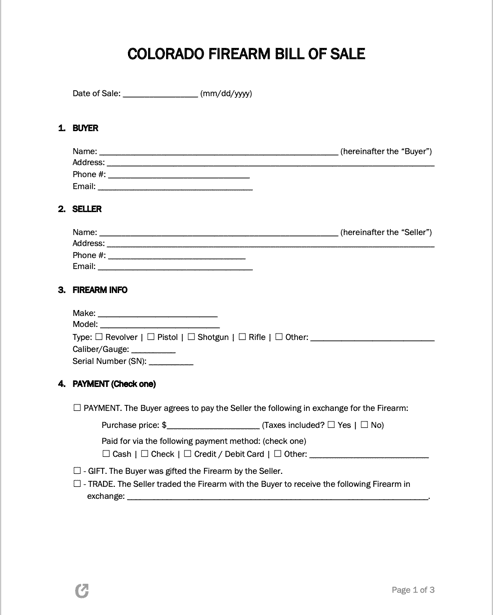Colorado Firearm Bill of Sale Form
A Colorado firearm bill of sale form conveys how a private seller sold a weapon to a buyer. It provides the details of the transfer, such as the type of gun, price, and payment method. The state and federal governments do not record private gun sales. Therefore, the buyer and seller do not need to register the firearm or document the transaction. However, they should complete a private bill of sale form to verify the change in ownership.
|
What is a Colorado Gun Bill of Sale?
A Colorado gun bill of sale represents a legal purchase between a buyer and seller. It implies the seller has inspected and approved the buyer’s criminal and mental health background. The document covers handguns, shotguns, and rifles, but not large-capacity ammunition magazines or machine guns. Individuals that own a machine gun without a permit can accrue multiple felonies if caught.
Per § 18-12-111, the seller must ensure the buyer can legally own a firearm before completing a bill of sale document. If a private seller unlawfully transfers a gun to an unqualified individual, then law enforcement can charge them with a class 4 felony (i.e., $2,000 to 500,000 in fines and two (2) to six (6) years in prison). A licensed dealer commits a class 2 petty offense (i.e., $250 in fines) if they do not post a sign with the state requirements for purchasing a gun.
Private sellers must run a background check on the potential buyer before completing a bill of sale and exchanging ownership. Criminal and mental record checks occur at a licensed dealer. If approved, the transferor and transferee can carry out the deal as long as they complete the required documentation (§ 18-12-112).
How to Apply for Concealed Handgun Permit (CHP)
Residents (eighteen (18) years of age or older) can open carry guns in public or private areas, but they cannot concealed carry without a permit. If individuals receive a CHP, they can hide weapon(s) on their bodies in authorized locations. However, the license does not exempt them from undergoing a background check during dealer purchases.
Step 1 – Review Eligibility Requirements
Submitting an application does not mean the local Sheriff’s Department or Colorado Bureau of Investigation (CBI) approves it. The individual must meet the following qualifications for consideration (§ 18-12-203):
- A Colorado resident;
- Over the age of twenty-one (21) years;
- Not a felon and do not have a criminal history;
- Truthful in their application (by answering all questions honestly);
- Not experiencing alcoholism or drug addiction;
- If the individual has a history of addiction, they must be three (3) years sober after treatment. They must also obtain a signature from a licensed therapist stating that they are psychologically sound.
- Trained and able to properly use a handgun; and
- In good standing with the law.
Step 2 – Pass Training Course
Before applying, the resident must pass a handgun safety course approved by the state of Colorado. The certified instructor must sign a formal document stating the student met the necessary qualifications. The certification form must accompany the application.
Step 3 – Locate Sheriff’s Office
Colorado does not have a statewide system for CHP applications. Instead, county sheriff’s offices handle the process.
The interested party must go to their county’s sheriff’s department and request an application, which they must complete at the office. They must also provide a certification of handgun safety training and a photograph that matches the image on their driver’s license, state ID, or military card.
Bring the Following:
|
Step 4 – Attend Interview
If the state approves the application, training certificate, photograph, and ID standards, the applicant must meet with the local county office. The interviewer provides the interviewee with a criminal history assessment agreement and consent form. By signing, the individual gives the state permission to carry out a background check using their given fingerprints.
Step 5 – Wait for Approval
Each county has a unique process for approving or denying applications, meaning the response time varies. Offices advise that it could take up to ninety (90) days for applicants to receive approval or denial.
Step 6 – Renew
A CHP last for five (5) years. The licensee can renew up to one hundred and twenty (120) days before the expiration date. Late fees accrue for individuals who do not re-apply on time. The resident has six (6) months to renew after the permit expires. After this time, they must apply as a new applicant.
Each county has unique requirements for renewal. Some jurisdictions only allow online applications, whereas others request the CHP holder to visit an office in person.
